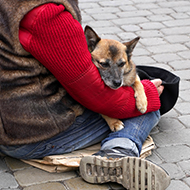
Study shows homeless pet owners have reduced access to accomodation.
Researchers at the University of Nottingham are calling for policy changes to ensure that homeless dog owners are not forced to choose between keeping their pet and having a roof over their head.
The team from the Schools of Veterinary Medicine and Science and Sociology and Social Policy believe that initiatives such as the updated Model Tenancy Agreement and the proposed Jasmin's Law would enable more pets and their owners to stay together.
Their call comes after a study by the departments revealed that homeless pet owners had reduced access to services including accommodation, advice and healthcare. It also highlighted the importance of the pet-owner relationship and its positive impact on physical and mental wellbeing.
Study author Dr Jenny Stavisky commented: “Homeless pet owners have not been studied in much detail to date, and we can see through our analysis that there is a real gap in services for this group in the UK. This will have only been heightened by the Covid-19 pandemic.
“The stigma surrounding homelessness and dog ownership could be addressed by recognising the importance of these relationships to both animal and human health.”
Human Companion Animal Bond
Despite pet ownership among the homeless already being linked to a range of health and social benefits - including alleviating loneliness, isolation and depression - it remains a barrier to accessing support services. In this study, experts explored the nature of the Human Companion Animal Bond between UK homeless owners and their dogs, and how this bond impacts the health and welfare of both parties.
Lead researcher Louise Scanlon interviewed 20 homeless or vulnerably housed dog owners, between the ages of 23-65, from locations across England. Among the common themes to emerge from the interviews were:
- Many participants described their pets as kin - like friends or family, sharing closeness and unconditional love; “He is my best mate. I love him as much as I love myself. We are both the same.”
- The notion of animals as ‘kin’ appeared to create a sense of responsibility, giving them obligation for someone other than themselves; “Our dogs would eat before anyone else.”
- Some owners admitted if they lost their pet, they would lose any incentive to take care of themselves; “I don’t know what I’d do; it would be a massive gap in my life. I’d probably stop eating.
- Several dog owners in the study reported an increase in physical activity and motivation to go outside because of their dogs.
- Participants also spoke about being protected from physical threat by their dogs, while others said the practical need to provide for their dog resulted in a reduction of substance misuse.
Dr Stavisky added: “It is clear from this sample of homeless dog owners, that the relationship with their pets is really important to them. There are also clear benefits to their health wellbeing from owning a dog. We need to see policy changes, which will remove barriers to essential services to help ensure that homeless pet owners are not forced to choose between a roof over their head and their pet.”
She added: “New initiatives such as the updated Model Tenancy Agreement are to be welcomed. If the proposed Jasmine’s Law, which was partly inspired by a homeless man who died as a result of being separated from his pets, is passed, this will enable more homeless families, with two feet or four, to stay together.”
A growing problem
Homelessness is a growing problem across the world. In the UK, an estimated one in 200 people are homeless, accounting for 0.5 per cent of the population - and this is only rising further as a result of the coronavirus pandemic.
Several charities and student-led initiatives across the UK already work tirelessly to ensure that homeless people and their pets can stay together, namely Street Paws, Street Vet and St Mungo's. The Dogs Trust Hope Project also supports homeless dog owners directly, by covering veterinary costs and finding accommodation.
The study was funded by Dogs Trust and conducted in collaboration with the School of Psychology at the University of Southampton. Results are published in the journal Anthrozoos.



 The Veterinary Medicines Directorate (VMD) is inviting applications from veterinary students to attend a one-week extramural studies (EMS) placement in July 2026.
The Veterinary Medicines Directorate (VMD) is inviting applications from veterinary students to attend a one-week extramural studies (EMS) placement in July 2026.